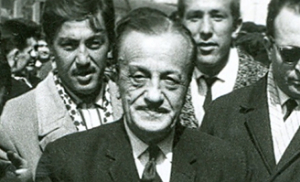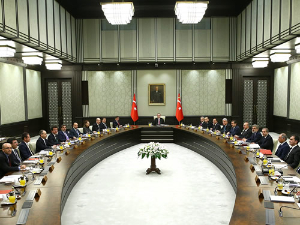A pattern of death: Turkey’s progressives are prey to the Leviathan
By Halil Karaveli
October 16th, 2015, The Turkey Analyst
Turkey’s democrats, leftists and minorities have always been prey to the sinister machinations of the multi-tentacle Leviathan that is in charge of the country. Arrayed against them have been authoritarian right wing governments, the military and the deep state. The Ankara massacre is a reminder of who the victimized “others” in Turkey really are. It is also a reminder that the course of modern Turkish history has more than anything else been shaped by a sustained effort to stamp out any kind of challenge from the left. The deep reservoir of popular, ultraconservative, ultranationalist resentment has continued to yield politically instrumental mass murderers. It has ensured that fascism – whether in Kemalist or Islamic disguise – has always prevailed in Turkey.
Turkey Is Not Going to Be “Normalized” Under the AKP’s leadership
By Toni Alaranta (vol. 8, no. 14 of the Turkey Analyst)
There is widespread expectation that “normalization” and democratic consolidation will follow the June 7 election, which deprived the ruling Justice and Development Party (AKP) of its majority. The talk about “normalization” and President Recep Tayyip Erdoğan becoming “isolated” presupposes that Turkey’s democratic travails emanate exclusively from Erdoğan’s power hunger, and that once this factor is eliminated, the AKP will once again become the “normalizing force” it allegedly was previously. However, “normalization” would mean abandoning not only Erdoğan but the very political narrative disseminated by the AKP during its years in power, and thus the mission of the party.
The Case for a Coalition with the CHP: the AKP Needs to Refurbish Its Image in the West
By Halil Karaveli (vol. 8, no. 14 of the Turkey Analyst)
The AKP’s loss of its absolute majority in the June 7 parliamentary election may paradoxically offer the regime the chance to refurbish its tarnished image in the West. That, at least, is how some of the leading representatives of the regime judge the present situation. A coalition government with the center-left CHP is perceived as a chance for the AKP to rid itself of the charges of authoritarianism. Western endorsement has always been critically important for AKP, and the party is desperate to regain its lost legitimacy in the West. The question, though, is why the CHP would even contemplate lending itself to a project that would only entrench the AKP regime.

The AKP and Turkey’s Long Tradition of Islamo-Fascism
By Toni Alaranta (vol. 8, no. 3 of the Turkey Analyst)
Those who claim that democracy in Turkey has been handicapped because of the repressive “Kemalist” regime overlook that the conservative right has totally dominated Turkish politics. It is the traditions of the Turkish right that need to be scrutinized in the search for the matrix of current undemocratic practices. The Turkish Islamist poet and political ideologue Necip Fazıl Kısakürek is a key figure in this context. He propagated for a totalitarian Islamist-fascist regime in Turkey, to be ruled by an Islamic version of a Führer. And today representatives of the AKP point out that understanding Kısakürek is a precondition to understand the great “cause” (“dava”) that the AKP represents.

The Long Road that Led to the AKP’s “New Turkey”
By Fatih Yaslı (vol. 28, no. 1 of the Turkey Analyst)
The regime that the AKP is constructing certainly deserves to be defined as “new.” However, a proper understanding of the rise of the Islamists requires that their ascent is put in the right historical context, and that the true nature of the old Turkish regime is appreciated. Turkey’s Islamization has a long prehistory. It has been a long time since the radicalism of Kemalism was discarded. Instead, religion and conservatism have been consistently promoted in the name of anti-socialism.






